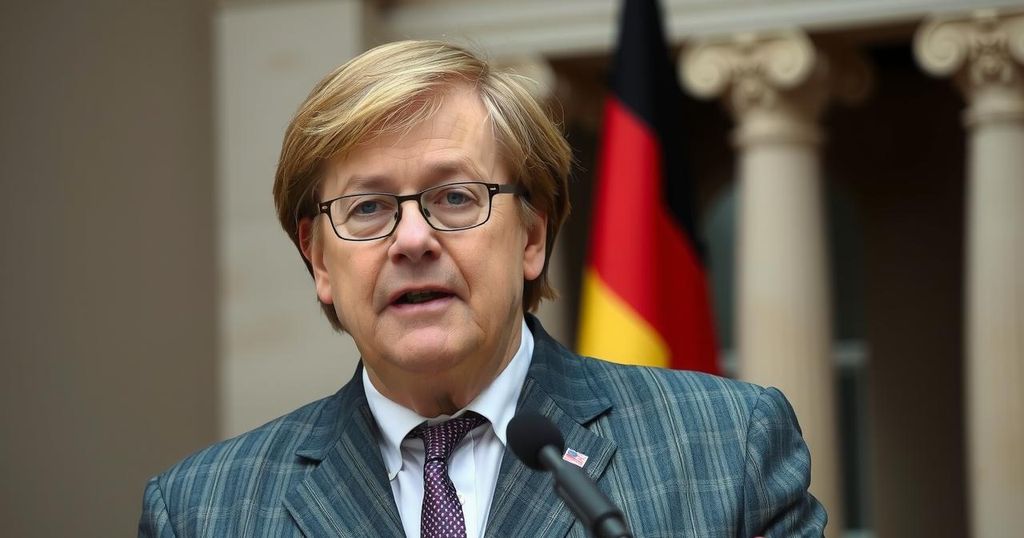Politics
AFD, ALTERNATIVE FOR GERMANY, ASIA, BELLEVUE PALACE, BERLIN, CHRISTIAN LINDNER, DEMONSTRATIONS, ELON MUSK, EUROPE, FREE DEMOCRATS, FRIEDRICH MERZ, GERMANY, GOVERNMENT, MIDDLE EAST, OPPOSITION CRITICISM, POLITICS, POPULISM, SAUDI ARABIA, SCHOLZ, SOCIAL DEMOCRAT, TALE, UKRAINE
Leila Ramsay
0 Comments
Germany’s President Dissolves Parliament, Snap Elections Confirmed for February
German President Frank-Walter Steinmeier has dissolved parliament, confirming elections for February 23, following Chancellor Olaf Scholz’s loss of confidence. Scholz remains as caretaker amidst public safety concerns after a recent attack, while the rise of the Alternative for Germany party complicates coalition-building for future governments. President Steinmeier has called for a fair electoral process free from foreign influences and emphasizes the need for effective governance in handling pressing national issues.
In a significant political development, German President Frank-Walter Steinmeier has officially dissolved the parliament, confirming that snap elections will occur on February 23. This decision follows a recent crisis in Chancellor Olaf Scholz’s government, which lost a confidence vote earlier this month due to the departure of Finance Minister Christian Lindner’s Free Democrats. As a caretaker chancellor, Scholz remains in his position amid rising national turmoil following a car-ramming attack at a Christmas market, igniting discussions regarding security and immigration policies.
During his address at Berlin’s Bellevue Palace, President Steinmeier underscored the necessity for a stable and functioning government, stating that the nation requires “a government capable of acting” and “reliable majorities in parliament.” He called for an orderly electoral process, emphasizing the importance of fair campaigning and warning against foreign influence, particularly in relation to misinformation on social media platforms. Steinmeier further highlighted the critical issues facing the future administration, including economic stability and international conflicts, while urging political parties to prioritize effective problem-solving.
As the political landscape shifts, polls indicate that conservative challenger Friedrich Merz, who criticizes the current government’s regulatory approach, leads the Social Democrats by a considerable margin. The presence of the Alternative for Germany (AfD) party, which has gained public support, complicates coalition-building efforts, as mainstream parties have expressed reluctance to govern in collaboration with AfD members. This political uncertainty is indicative of ongoing debates within Germany regarding governance and societal values in a challenging climate.
This article addresses the recent political upheaval in Germany, reflecting on the dissolution of the parliament by President Frank-Walter Steinmeier and the forthcoming snap elections prompted by Chancellor Olaf Scholz’s loss of political support. The context is further enriched by discussions surrounding national security issues following a tragic incident during the Christmas market and the role of far-right political elements within the electoral framework. Understanding the implications of these events requires a broad awareness of Germany’s political dynamics, societal concerns, and potential pathways moving forward in governance.
In conclusion, the dissolution of Germany’s parliament and the announcement of snap elections signify a pivotal moment in the nation’s political landscape. With Chancellor Olaf Scholz serving as caretaker during these turbulent times, the country faces pressing challenges that must be addressed by the next government. The elections scheduled for February 23 will be crucial in determining the future direction of German politics, particularly in light of rising right-wing sentiments and unresolved societal issues.
Original Source: www.aljazeera.com




Post Comment